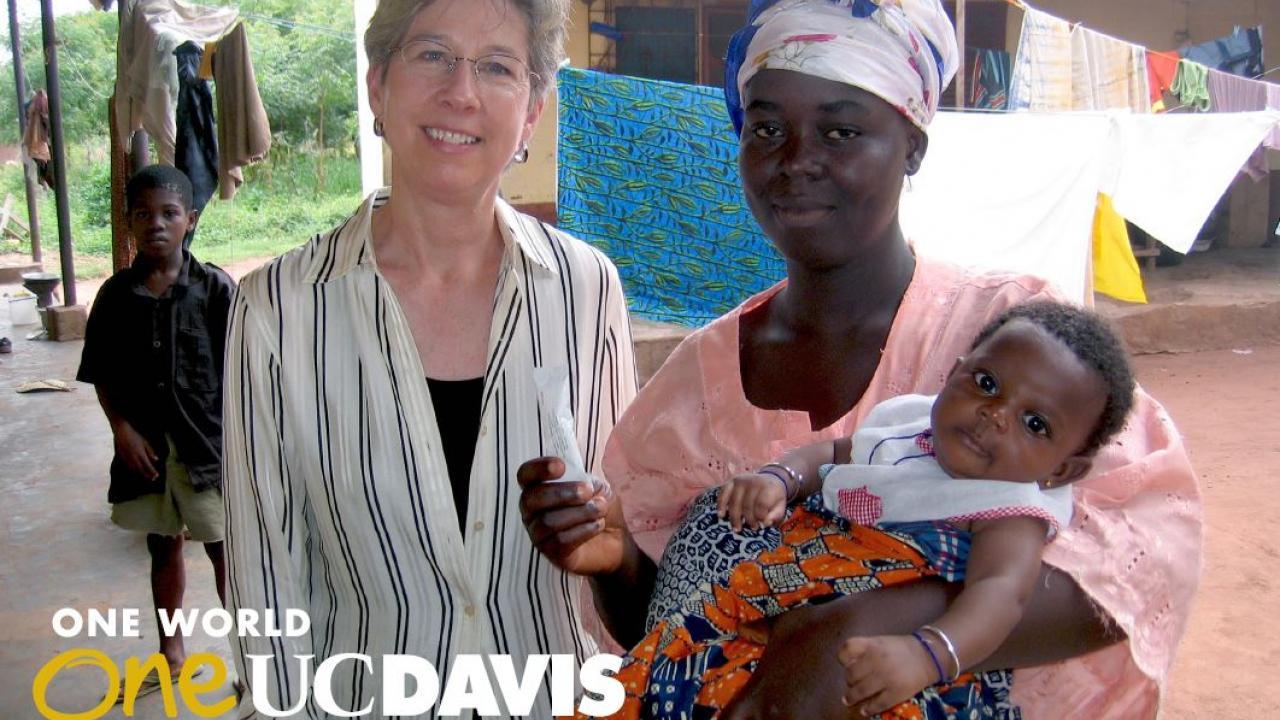
Invest in the Future
Contact
Contact: Shani Alford
College of Agricultural and Environmental Sciences
(530) 752-1184
sbalford@ucdavis.edu
INFANT HEALTH
An opportunity to make a difference in the struggle against malnutrition
INVEST IN THE FUTURE
Malnutrition is a leading cause of death in young children throughout the world. For infants and children under the age of two, the consequences of malnutrition are particularly severe, often irreversible. Improved nutrition for mothers and young children is one of the best investments we can make to achieve lasting progress in global health and development.
For nearly 35 years, UC Davis distinguished nutrition professor Kathryn “Kay” Dewey has been a leader in research on maternal and child nutrition, infant feeding, and assessment of child growth. Her work has contributed key evidence prompting changes in global policies and guidelines.
With major support from the Bill & Melinda Gates Foundation and others, Professor Dewey has directed large-scale collaborative research projects in Africa and South Asia aimed at preventing maternal and child malnutrition. Her research on infant feeding has influenced policy and helped numerous mothers to successfully breastfeed their infants. She directed the Program in International and Community Nutrition from 2008-2018 and trained dozens of graduate students from around the world.
This area of research is a top priority of the U.S. government, funding organizations, and policy makers. Your philanthropic support will help UC Davis sustain its contributions to this important humanitarian effort.
HOW YOUR SUPPORT HELPS
As Professor Dewey nears retirement, UC Davis wants to ensure that her critical work continues. A faculty position focused on maternal and infant nutrition is a top priority in the Department of Nutrition, but these priorities don’t always match with faculty allocations in a timely manner. An exceptional new faculty member hired before Dewey’s retirement would ensure the continuity of research and student training.
Your support will help us maintain and expand work on maternal, infant, and child nutrition. Philanthropic support ensures a stable funding source for long-term projects, graduate student training, and outreach efforts to keep stakeholders informed. Endowed faculty positions energize an area of study, draw top students and researchers, and attract additional funding, effectively leveraging the university’s investment in faculty salary and benefits.
Endowed chairs are possible only by the generosity of donors — individuals, foundations, or institutions.
Your support helps us maintain and expand work on maternal, infant, and child nutrition. Philanthropic support ensures a stable funding source for long-term projects, graduate student training, and outreach efforts.
ENDOWMENT GOAL
Our goal is to raise $2.5 million to establish an endowed chair in maternal and infant nutrition in the Department of Nutrition. Income from the endowment would be managed by the faculty member awarded the endowed chair.
Donations can be made as an outright gift at one time or spread over a maximum of five years. Cash gifts are only one way to give. Estate plans, charitable rollovers from IRAs, securities, and real property are all options. Donors can expect annual programmatic updates and financial reports, an invitation to attend the annual endowed chair dinner hosted by the UC Davis chancellor, and opportunities to interact directly with the endowed chair holder.
We welcome the opportunity to partner with you for the future of the health and well-being of the world’s children. Please contact Pamela Pacelli for additional information.
 Kay Dewey’s lasting international impact
Kay Dewey’s lasting international impact
- Building on her research on infant growth, the World Health Organization (WHO) created new charts in 2006 that have resulted in improved assessment of child growth worldwide.
- Two Dewey-led trials in Honduras contributed key evidence prompting WHO in 2001 to recommend that infants receive only breast milk for the first six months of life, a policy now adopted by most developing countries.
- Dewey’s research in Mexico on delayed umbilical cord clamping showed that it reduced infant iron deficiency and anemia, a policy now supported by WHO and the Lancet Nutrition Series.
- With information from her studies in Honduras, Bangladesh, and Ghana, Dewey took a lead role in developing new WHO indicators to document progress in infant feeding in developing countries.
- Dewey’s work with organizations such as WHO, UNICEF, the March of Dimes, and the California Breastfeeding Promotion Advisory Committee has been instrumental in developing child nutrition policies and guidelines throughout the world.
